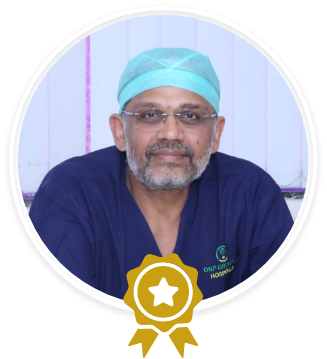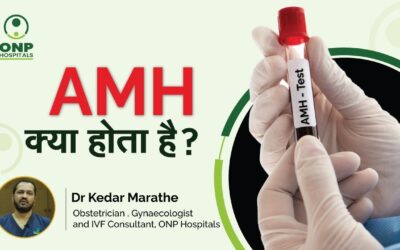As a pediatrician at ONP Hospitals, I’ve witnessed countless stories of resilience and recovery, but one case stands out—little Anaya’s story. Anaya, a spirited four-year-old, came to us after a severe finger injury that happened while she was playing in the backyard....
What Is the Success Rate of IVF on First Try?

One thing that every patient needs to know is that no matter what you do IVF has an average success rate of 40% worldwide. There is no way a clinic or a surgeon can provide a 70-80% success rate. If anybody is promising so, do not blindly believe them.
The success rate of IVF depends upon various factors and the procedure may or may not work in your case. However, some individuals are fortunate enough to get pregnant on the first cycle.
Now let’s take a glance at some facts on IVF.
How Does IVF Work?
IVF is an advanced reproductive technique that comprises a series of steps. Let’s look at the below process to see how it works:
- To begin with, a doctor shall retrieve eggs from the ovaries during a minor office procedure.
- These eggs are then fertilized by sperms (taken from a donor or the intended parent) in a laboratory which form embryos (term used for fertilized eggs).
- Next, we then transfer these embryos to the uterus while extra unused embryos are frozen for subsequent transfer. If successful, an embryo will implant in the uterus’s lining in about six to 10 days.
- One can resume usual daily activities after the transfer and wait for a positive pregnancy test.
One complete cycle of IVF will take about three weeks. Sometimes these steps could be divided into parts which may take more time.
What Factors Impact the Success of IVF?
Before you think about IVF, there is an emotional, physical, and financial burden involved, which you need to be prepared for. Hence, it would be sensible for you to look at some factors that impact the success rate of IVF mentioned below:
- quantity and quality of eggs, sperm, and embryos.
- Increasing age, especially after 40, the success rates decline.
- Ovarian stimulation protocol includes fertility medications prescribed by your doctor to develop several mature eggs that will result in pregnancy.
- The lining of the uterus determines the ease of embryo transfer, which is affected by its thickness, immunological factors, and the outline of the uterine cavity.
- Also, choosing the right clinic and a surgeon can impact the success rate of IVF.
How can I improve my IVF success?
If you are looking to increase your possibility of pregnancy during IVF, here are some tips from various studies & well-known experts:
- Maintain a healthy weight with a nutrient-rich diet and workout regime.
- Use multivitamins and dietary supplements to increase egg/sperm quantity and quality.
- Reduce your stress levels with stress-relieving techniques, like yoga and meditation.
- Quit smoking as smoking affects egg and sperm quality.
- Be persistent and patient. Don’t get disheartened if your first cycle wasn’t successful; your doctor may adjust the medications to have better outcomes in the next one.
- Choose the right fertility clinic and a specialist in IVF.
How to Find the Right Fertility Clinic?
Well, this might be a strenuous task. Let’s make it simple for you. To search for the right fertility clinic, look for these specific things:
- Please find out about the quality of their lab, whether they equipped it with the latest technology and have full-time in-house specialists and doctors.
- Check whether they provide complete transparency in the information given by the specialists and counsellors regarding their success rates.
- And are giving a step-by-step explanation of the procedure and the protocol they would follow in your case precisely.
- Look at the patient testimonials on their website.
- Make sure all doctors in the clinic are board-certified.
Conclusion
- The excellent news about IVF is that it is highly effective and can be successful after one cycle, but don’t forget that it may not be the case with everyone.
- Hopefully, now you must be well versed in the concept of IVF. If you consider it, reach out to specialists to know if IVF is right for you and your family.
- The specialist will further guide you through the procedure and give you recommendations that can help increase your chances of being pregnant after your first cycle of IVF.
If you are facing difficulties in conceiving naturally, consult our experts to complete your family. You can book an appointment with our infertility specialist to know the best treatment in your case.
About Author
More Blogs
Addressing Childhood Obesity: Preventative Measures and Healthy Lifestyle Choices
Childhood obesity is growing concern. More kids...
Healthy Sleep Habits for Children: Tips for Parents
Good sleep is essential for children’s health...
The Role of Diet and Nutrition in Managing Encopresis in Children: Insights from Dr. Amita Phadnis
Encopresis, a condition characterized by...
Videos
Dr. Amita Phadnis’s Full Speech on Survival & Health Rights at UNICEF India.
Dr. Amita Phadnis ,M.D., Gave a Motivating Speech
Breast cancer is cancer that forms in breast cells. Women are mostly diagnosed with this cancer. Although it can be seen in both men and women
What is AMH
The granulosa cells in your ovarian follicles create the anti-Mullerian hormone, often known as AMH. According to the American College of Obstetricians and Gynecologists (ACOG), the generation of AMH is a reflection of your ovarian reserve.
FAQ’s
Pregnancy and Migraine Headaches: What Women Need to Know
When you are pregnant or breastfeeding, then...
What Is the Problem of Orthopedics in Children?
While orthopaedic problems are commonly seen in and associated with the elderly, it’s important to be alert regarding the fact that they can afflict young people and children as well.
All You Need to Know About Reproduction
Most science students have to study about reproduction in their high school syllabus, and some learn from their parents, who may discuss it even earlier. It’s a very good thing to know about our own bodies…




 Home
Home Blogs
Blogs



